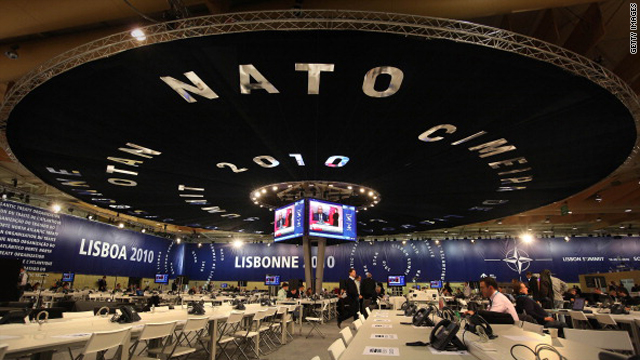Scammer
Banned

With the Cold War behind them, NATO members meeting this week in Lisbon, Portugal, will seek to assert their continued relevance.
At the Lisbon summit, NATO members will also adopt a new mission statement, or "strategic concept."
The strategic concept will aim to reinvigorate the NATO alliance 20 years after the end of the Cold War. Calling Lisbon, "one of the most important summits in the history of our alliance," NATO Secretary General Angers Fogh Rasmussen hopes the new global outlook will prove the organization is still relevant.
"No other organization can marshal, deploy and sustain NATO's military power," Rasmussen said last month."There will be other missions in future for which only NATO can fit the bill. We will have to be ready."
The mission statement document, prepared from recommendations made by a panel led by former Secretary of State Madeline Albright, will seek to build upon its work in Afghanistan to redefine NATO as a "global" actor that would work with regional partners to combat threats outside Europe.
The outcome of the war in Afghanistan is intrinsically tied to the future of the NATO alliance, a new analysis from RAND corporation suggested. The report, published Friday, warns that the U.S. lead in the war could undermine any future willingness to fight together if needed.
"In an alliance that finds achieving consensus is central, having one partner clearly overshadow all others highlights the real limits of the transatlantic alliance," the report said.
The difficulty and length of engagement will weigh on decisions by alliance members to intervene or aid in the future.
"The scope of NATO's future roles abroad may be more limited, such as focusing on humanitarian assistance or training, advising, and assisting nations that seek support. While these efforts may entail long-term commitments, they would fall well short of committing combat forces," wrote the RAND authors, Andrew Hoehn and Sarah Harting.
The search for a new mandate comes at a time that 16 of the 28 NATO members have announced cuts in defense spending. NATO officials said leaders are expected to agree at the summit on a list of the top ten spending priorities, including helicopters, transfer aircraft, technology to combat improvised explosive devices and increased medical capabilities.
The new strategic concept will cite current security challenges facing NATO members in the 21st century, such as terrorism, cyber warfare and piracy.
Rasmussen has encouraged NATO members to be more agile in order to respond to 21st century threats and to continue to invest in military technology despite the global economic downturn. He urged allies to "cut fat, not muscle" and pool military spending.
The United States is pushing for a realignment of military spending priorities.
"We have proposed and hope to have accepted a set of capabilities that the alliance, in a time of dwindling resources, will decide it must fund," U.S. Ambassador to NATO Ivo Daalder told reporters earlier this week. "Those are capabilities that deal with ongoing operations in Afghanistan, but also capabilities to deal with 21st century threats, including beefing up our cyberdefenses and embracing the deployment of missile defenses to protect European territory and populations against the growing threat of ballistic missiles."
Missile defense is a "key decision" for NATO leaders to make, Daalder said. But it is a contentious one because Russia has been vocal in its opposition to a European based system.
Rasumssen said the summit would be a "fresh start" in the relationship between Russia and NATO after strained ties over Russia's invasion of Georgia in 2008. Russian President Dmitry Medevdev will attend the first summit-level meeting of the Russia-NATO Council.
President Barack Obama also will hold a summit with EU leaders, seeking to reaffirm a partnership with Europe many feel has gone adrift as the United States expands its partnerships in Asia. Jobs and economic growth are expected to top with the agenda at a time of growing tension between the U.S. and European countries over the way to fix the global economy.
While the United States has pushed for stimulating economic expansion with more government spending, many European allies are tightening their belts.
The future of some 80,000 U.S. military forces in Europe will also be discussed. European leaders are looking for President Obama to keep U.S. troops at their current levels, although the Obama administration has urged Europe to share more of the burden in its own defense.
